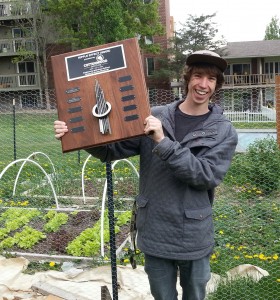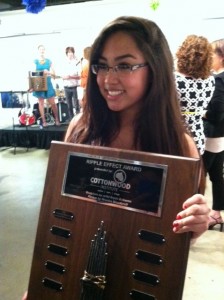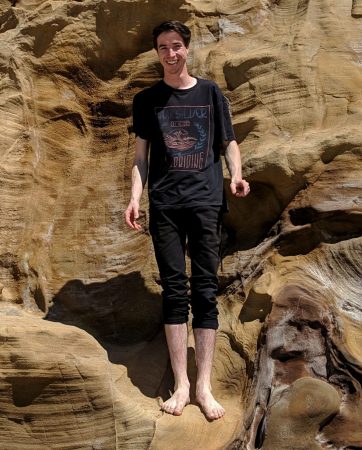As we continue to bask in the glow of last month’s Base Camp Bash, we’ve spent quite a bit of time reflecting on all of the amazing things Cottonwood Institute students have done this year. Our Ripple Effect Award Honorees Osiel Gomez and Pedro Guerra led the charge, educating their communities on the harms of idling cars and prescribed obsolescence. But those are just two of so many examples, and (we hope) only the beginning of their journeys to become champions for the environment.
And that got us wondering what our other fabulous Ripple Effect alumni have been up to in the years since their CI programs. So we reached back into the archives to reconnect with two past Cottonwood superstars, 2014 Ripple Effect Award Winners Estrella Damian and Robert Harding.
Five years ago, Estrella was helping her classmates at STRIVE Prep – Excel launch a worm composting program. She’s still in the neighborhood these days, working on a double major at the University of Denver and bringing her leadership skills to a new community as a Resident Assistant. Robert, honored in 2014 for being an all-around rockstar with New Vista High School’s Earth Task Force (ETF), has continued working to change his world as he pursues a degree in Environmental Studies.
Both were kind enough to answer a few questions about what they’ve been up to in the years since.
Estrella Damian (STRIVE Prep – Excel)
What CI program(s) did you take?
I participated in the Mini Community Adventure Program.
What are you up to these days?
I am currently at DU double-majoring in Creative Writing and Strategic Communications. I also just started a new job as a Resident Assistant! I had applied for the position for next year, but they let me start one quarter early because somebody graduated. Now I have my own apartment and a bunch of residents to help out. I’m taking an AMAZING fiction class this quarter and we just started workshops (mine is in a couple weeks, yikes). I’m super excited to be about halfway done with school. I think I may even be able to graduate early.
What do you remember most about your CI experience?
I remember going to a wolf sanctuary and volunteering with clean-up in order to camp and hang out with the wolves. That was so awesome and strengthened my love for the natural world.
Are there any skills or things you learned from CI that have come in handy in your life?
I have gained the courage to help out in my community and create the kind of environment I want to live in. This is especially true in my role as an RA because I play a pretty big part in the events and activities that go on in our residential communities. I also serve as a resource to residents; our relationship has a dynamic of mutual learning. I try to teach them everything I can about navigating college and they help me become a better leader.
Looking back now, how has your CI experience impacted you long term?
My CI experience has shown me that there is no limit to what you can contribute to your community. Community leadership is definitely something that I am passionate about after my experience with CI.
How has your CI experience helped you create positive change in your community?
This kind of goes back to the RA role, but so far I have brought ideas to our campus leadership professionals about implementing compostable to-go boxes for our dining halls. The dining halls lose a lot of money in plates because residents will take them to their rooms and not return them. The compostable to-go boxes are meant to alleviate that issue in a sustainable and effective way. It’s a win-win for our catering company (Sodexo), residents, and the environment.
Based on your CI experience, what advice would you give to other students?
I would tell other students to make the most of their time with CI because it goes by so fast. It’s an amazing program that provides unique opportunities to be involved in your community. It is a great learning experience that should be appreciated.
Robert Harding (New Vista High School)

What CI program(s) did you take?
I was part of the Earth Task Force, which was connected to the Cottonwood Institute.
What are you up to these days?
Now I am in college at CSUMB, California State University, Monterey Bay, majoring in Environmental Studies. After New Vista and the Earth Task Force, I was really burnt out on environmental stuff. It was a lot for me, and then moving out to California where you drive everywhere, the culture change was a lot. We didn’t even have a three-way stream [recycling] system on campus.
So I went into marine science, and didn’t like that, so I dropped that and went to experience a year off working in restaurants. And then I was like, “I need to be doing something more.” So I went into environmental studies with the hopes of causing real change and getting back into pushing for change in my community.
I would like to do something with food in the future. I’ve done a lot of restaurant work, and I work in kitchens, and I want to connect the two with getting people access to sustainable food and learning how to eat sustainably.
What do you remember most about your ETF experience?
I remember the support. There was a huge amount of support around it. Certainly at that age, [I felt] empowered to do something in my community that was causing change—and at the time that felt very daunting, and still does—but at that age, you could get whipped up into that idea that there’s nothing you can do. And then there was this task force that I could join that was doing everything that it could at my school and in my local community to just do something. And I loved it.
What was that something? What were your projects?
We did a plastic bag ban rally at some point, where we contacted some community leaders and tried to push for a plastic ban at the state level or certainly in the city of Denver. We spoke to lots of community leaders, did an activism walk in Denver, we did local lunches at the school and I helped organize that, and then I spoke on the State Senate floor for sustainable schools. I spoke to a State Senator—I don’t remember their name at this point—but we got to see the legislative process and go through it and do a testimony for why it was important to have schools be sustainable.
Are there any skills or things you learned from those days that have come in handy in your life?
I currently work for the Sustainability Office at CSUMB. One of those things that I really learned was talking to adults who had a lot more power than me, so not necessarily talking to adults because I am an adult now, but talking to my supervisors and to faculty members, because I’m currently working on a green office certification program so I have to work directly with faculty members. And they have a lot of power, so learning how to speak to them in a productive way [is important].
Looking back now, how has your CI experience impacted you long term?
It was that empowerment that was given to me. I lost it because it was just a very difficult change to go from high school to college for me, but once I got it back again I used a lot of those skills that I learned in ETF to push into my job working at the school.
What do you remember about winning the Ripple Effect Award?
It was kind of a whirlwind right at the end of my work. I remember [ETF Instructor] Paige [Doughty] nominating me for it, and I didn’t even know what it was. But I thought it was really cool and a really rewarding experience to be recognized for some of the work that I’d done. And not just seeing the change, but having local community members actually recognize what I had done.
Thank you to our 2014 Ripple Effect Award Winners, Estrella Damian and Robert Harding, for their contributions!
Get involved with our Cottonwood Institute alumni and community!
- Follow us on Facebook, LinkedIn, and Instagram
- Join our Facebook CI Alumni group at: https://www.facebook.com/groups/49045662698/
- Send us your stories of what you have been up to since CI! Email us to get connected!


